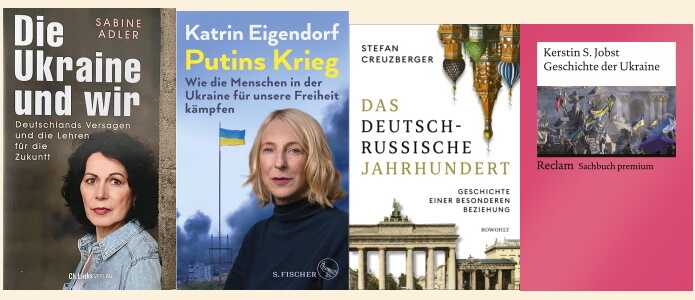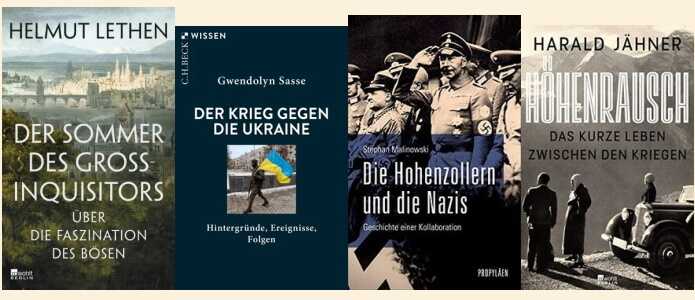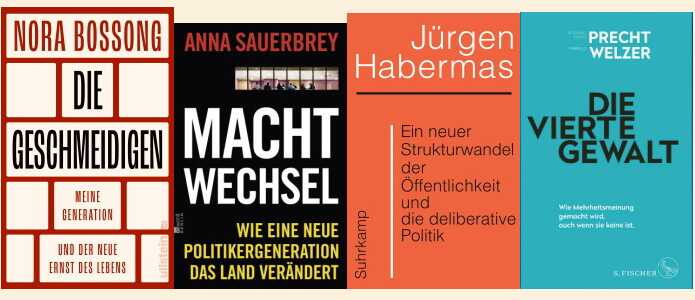Bookworld
Vigorously debated, brilliantly expressed

by Alexander Cammann
In 2022 Germany ought really to have re-awakened from the bizarre and unusual state that had held us all in its grip throughout the two years of the pandemic. The violent swings in personal and public discussions about the corona virus, alternating between neurotic hysteria and stultifying apathy, were over at last! But instead, war descended on Europe on 24 February with Russia’s invasion of Ukraine, and fear was once again the order of the day. The non-fiction book sector was quick to respond: experienced journalists such as Sabine Adler (Die Ukraine und wir, ‘The Ukraine and us’, Ch. Links) and Katrin Eigendorf (Putins Krieg, ‘Putin’s war’, S. Fischer) produced first-hand accounts of the war; historians threw much-needed light on the history of this too-little-known part of the world. Ahead of the invasion, Stefan Creuzberger had already analysed the complex relationship between the Russians and the Germans (Das deutsch-russische Jahrhundert, ‘The Russian-German century’, Rowohlt), Kerstin S. Jobst provided a compact Geschichte der Ukraine (‘The history of Ukraine’, Reclam), while Gwendolyn Sasse quickly came out with a conspectus of the historical and present-day background to the conflict (Der Krieg gegen die Ukraine, ‘The war against Ukraine’, C.H. Beck). And the 83-year-old literary scholar Helmut Lethen offered some fascinating reflections on a central and consequential figure in Russian intellectual history, the Grand Inquisitor in Dostoievsky’s novel The Brothers Karamazov (Der Sommer des Großinquisitors, ‘The summer of the Grand Inquisitor’, Rowohlt Berlin).
More generally speaking, books on historical topics have for many years been reliable winners in the field of non-fiction, and this has remained the case in 2022 as well. Thus for instance Stephan Malinowski won the German Non-fiction Prize, awarded this year for only the second time, with his book Die Hohenzollern und die Nazis (‘The Hohenzollerns and the nazis’, Propyläen), in which he intervened in the debate around the aristocratic dynasty’s claims for reparations and gave a graphic account of the Hohenzollerns’ involvement in the assaults on the Weimar Republic and the rise of National Socialism. Following the model of the distinguished German Book Prize for fiction, the German Non-fiction Prize is aimed at honouring the year’s best contribution to the genre, thereby raising the profile of the sector as a whole. The journalist Harald Jähner scored a big success with his book Höhenrausch (‘Dangerous ecstasy’, Rowohlt Berlin), in which he links the wild and febrile 1920s and the ensuing years of the nazi dictatorship in graphic and vivid terms. The historian Michael Wildt also deals with this same era in his book Zerborstene Zeit. Deutsche Geschichte 1918-1945 (‘An age asunder. German history 1918-1945’), for which he won the highest award in his field, the Prize of the Historisches Kolleg (Institute for Advanced Study in History) in Munich. Brilliantly written books on history remained a key trend: Jörg Bong, the detective story author and former publisher at S. Fischer, published Die Flamme der Freiheit (‘The flame of freedom’, Kiepenheuer & Witsch), the first volume in a proposed large-scale trilogy on the German Revolution of 1848 and the democratic tradition of which it was part. It thus seemed almost like a deviation from the norm when the traditionally important Leipzig Book Fair Prize for Non-fiction was awarded to the poet and translator Uljana Wolf for her collection of essays Etymologischer Gossip (‘Etymological gossip’, kookbooks), in which she reflects on writing and on the challenges of translating books from one language and culture to another.
In their different ways, Christiane Hoffmann and Natan Sznaider both ventured into areas of our past that are still poisonous. Hoffmann, currently Deputy Spokeswoman of the Federal Government, sets off on a journey in the footsteps of her father, who in 1945 fled from his home village in Silesia (Alles, was wir nicht erinnern, ‘All the things we no longer remember’, C.H. Beck), while Natan Sznaider in his book Fluchtpunkte der Erinnerung (‘Vanishing points of memory’, Hanser) looks at the complex and highly emotive debate on the relationship between the Holocaust and our colonial past.
But alongside all this German history there is also the very immediate present – and numerous books have appeared on the topics of climate change, antiracism and emancipation. And thoughts are increasingly turning to the question of how the younger generation are reacting to these major challenges. The author Nora Bossong (Die Geschmeidigen, ‘The smoothies’, Ullstein) and the journalist Anna Sauerbrey (Machtwechsel, ‘Power shift’, Rowohlt) have undertaken a group analysis of those in their forties in current German politics, who – as is plain to see – are steadily assuming key positions in the country thanks to the ‘traffic light’ coalition. What motivates them, and what are they capable of achieving within German society? With climate change and war, the key challenges have become abruptly and dramatically acute.
But do the media in this country in their capacity as the main forum for public discussion respond appropriately to the new challenges facing this younger generation? Jürgen Habermas, the veteran doyen of public debates in Germany and the world’s most distinguished living philosopher, now 93, sparked a furore with his slim volume Ein neuer Strukturwandel der Öffentlichkeit und die deliberative Politik (‘A new structural transformation of the public sphere, and deliberative politics’, Suhrkamp), in which he investigates the way that social media with their fake news and shitstorms pose a threat to democratic negotiation processes established over a period of several decades. Critiques of the media unexpectedly became a major phenomenon, and topped the bestseller lists: Richard David Precht und Harald Welzer, who have long been brilliantly successful pros in dealing with press, radio and TV, put German media firmly in the dock in their book Die vierte Gewalt (‘The fourth estate’), arguing that they were often tendentious and prejudiced, too quick to follow the herd, and insufficiently resistant to the outpourings of the twitterati. This diagnosis in its turn gave rise to vigorous debates – thus demonstrating that the medium ‘book’, so often dismissed as hopelessly passé, still plays an important role in dynamising public debate in Germany.
Alexander Cammann, born 1973 in Rostock, studied History and Philosophy at university, and lives in Berlin. He has been non-fiction editor on the Review section of Die Zeit in Hamburg since 2009.
Translated by John Reddick
Copyright: © 2023 Litrix.de
In 2022 Germany ought really to have re-awakened from the bizarre and unusual state that had held us all in its grip throughout the two years of the pandemic. The violent swings in personal and public discussions about the corona virus, alternating between neurotic hysteria and stultifying apathy, were over at last! But instead, war descended on Europe on 24 February with Russia’s invasion of Ukraine, and fear was once again the order of the day. The non-fiction book sector was quick to respond: experienced journalists such as Sabine Adler (Die Ukraine und wir, ‘The Ukraine and us’, Ch. Links) and Katrin Eigendorf (Putins Krieg, ‘Putin’s war’, S. Fischer) produced first-hand accounts of the war; historians threw much-needed light on the history of this too-little-known part of the world. Ahead of the invasion, Stefan Creuzberger had already analysed the complex relationship between the Russians and the Germans (Das deutsch-russische Jahrhundert, ‘The Russian-German century’, Rowohlt), Kerstin S. Jobst provided a compact Geschichte der Ukraine (‘The history of Ukraine’, Reclam), while Gwendolyn Sasse quickly came out with a conspectus of the historical and present-day background to the conflict (Der Krieg gegen die Ukraine, ‘The war against Ukraine’, C.H. Beck). And the 83-year-old literary scholar Helmut Lethen offered some fascinating reflections on a central and consequential figure in Russian intellectual history, the Grand Inquisitor in Dostoievsky’s novel The Brothers Karamazov (Der Sommer des Großinquisitors, ‘The summer of the Grand Inquisitor’, Rowohlt Berlin).




Alexander Cammann, born 1973 in Rostock, studied History and Philosophy at university, and lives in Berlin. He has been non-fiction editor on the Review section of Die Zeit in Hamburg since 2009.
Translated by John Reddick
Copyright: © 2023 Litrix.de